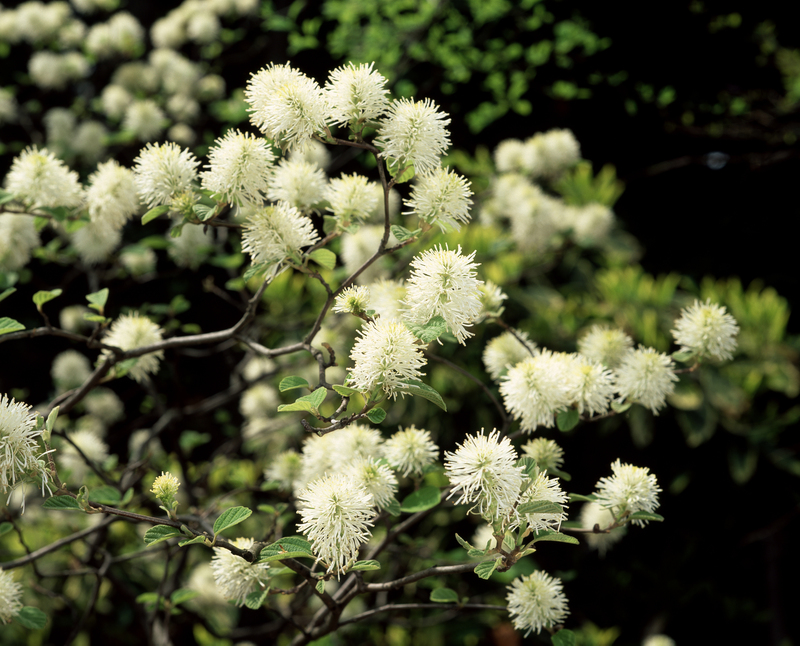Crafting Fertile Grounds with Organic Waste
Posted on 13/06/2025
Crafting Fertile Grounds with Organic Waste: A Comprehensive Guide to Sustainable Soil Health
Transforming organic waste into fertile, nutrient-rich soil is one of the most powerful methods available to sustainable gardeners, eco-friendly homeowners, and modern farmers. In this comprehensive guide, we unravel the secrets of crafting fertile grounds using organic waste, explaining the science, how-tos, benefits, and innovative ideas for everyone eager to cultivate richer soils and a healthier environment.
Understanding the Importance of Fertile Grounds
Before diving into the art of crafting fertile soils with organic waste, let's explore why fertile ground matters:
- Enhanced Plant Growth: Rich soil ensures plants receive the essential nutrients required for robust growth, vibrant blooms, and bountiful yields.
- Increased Soil Biodiversity: Healthy soils foster thriving ecosystems beneath the surface, providing homes for earthworms, beneficial microbes, and insects.
- Improved Water Retention: Fertile grounds retain moisture better, promoting drought resistance and reducing the need for constant irrigation.
- Reduced Chemical Dependence: Productive soils diminish the necessity for synthetic fertilizers and pesticides, supporting a greener planet.
All these benefits begin with the quality and health of the soil--qualities significantly improved through the intelligent use of organic waste.

What Is Organic Waste?
Organic waste includes any natural, biodegradable matter that comes from plants, animals, or food leftovers. Common types include:
- Vegetable and fruit peels
- Coffee grounds and tea bags (without synthetic parts)
- Grass clippings, leaves, and yard trimmings
- Eggshells
- Animal manure (from herbivores)
- Paper products (unbleached and not glossy)
This material is often seen as trash, but when repurposed, it provides the fertile building blocks for soil enrichment.
Why Use Organic Waste for Soil Fertility?
Utilizing organic waste to create fertile ground doesn't just recycle nutrients--it also:
- Reduces landfill burdens, cutting methane emissions caused by anaerobic decomposition of food waste in dumps.
- Lowers garden and farm costs by providing a consistent, free source of organic matter.
- Builds a sustainable loop, where waste feeds the next generation of plants and crops.
Through these benefits, crafting fertile soil from organic waste directly contributes to a more circular, sustainable, and robust food system.
How to Craft Fertile Grounds with Organic Waste: Step-by-Step
1. The Art of Composting
Composting is the most popular method for crafting fertile ground from organic waste. This natural process transforms biodegradable material into dark, crumbly, sweet-smelling humus packed with nutrients.
How to Compost Effectively:
- Start with a balance: mix 'green' materials (like food scraps and grass) rich in nitrogen with 'browns' (like dry leaves, straw, or cardboard) high in carbon.
- Maintain moisture--think of a wrung-out sponge.
- Turn or aerate the compost regularly to enhance oxygen flow.
- Monitor the pile: a good compost heap should heat up as microbes break down the waste, then cool as it matures.
- After a few months, the compost will be ready to use as a soil amendment or mulch to enhance fertility.
2. Vermicomposting: Harnessing Worm Power
For those with limited space or indoor ambitions, vermicomposting offers a powerful alternative. This process uses red worms (Eisenia fetida) to break down organic residues into rich worm castings.
Key Steps for Vermicomposting:
- Build or buy a worm bin with drainage and bedding (shredded newspaper or coconut coir).
- Add food scraps in small quantities--worms love coffee grounds, banana peels, and vegetable trimmings.
- Harvest the dark, crumbly castings after a few months and add to your soil for a potent fertility boost.
3. Sheet Mulching: Composting in Place
Sheet mulching, or 'lasagna gardening', layers organic waste and browns directly over soil or grass to create instant garden beds and build fertile ground on-site.
How to Sheet Mulch:
- Weed the area and moisten the ground.
- Lay down a thick layer of cardboard or newspaper to suppress weeds.
- Add alternating 'green' and 'brown' layers, just like traditional composting.
- Top with mulch or compost, and plant straight into the layered bed after several weeks.
4. Trench Composting: Buried Treasure
Burying organic waste in trenches directly in the garden allows the decomposition to happen underground. This low-maintenance process enriches the soil at root level.
Simple Steps:
- Dig a trench about 12-18 inches deep where you wish to enrich the soil.
- Add kitchen waste and cover with soil.
- Wait several months before planting into the area, giving time for breakdown.
5. Bokashi: Fermenting for Fertility
Bokashi composting uses beneficial microbes to ferment all kinds of organic waste--even dairy and small bones--into soil-building pre-compost.
How Bokashi Works:
- Place food scraps in a sealed bucket and sprinkle with bokashi bran (rich in effective microorganisms).
- Press down waste to minimize air exposure.
- After two weeks, bury the fermented mass in garden soil to complete decomposition and improve soil fertility.
What Happens When You Add Organic Waste to Soil?
When you incorporate organic residues into garden beds, several remarkable transformations occur:
- Improved Soil Structure: Organic matter acts like a sponge, binding soil particles and preventing compaction.
- Enhanced Microbial Diversity: Fertile soils teem with bacteria, fungi, and beneficial microbes that break down materials and make nutrients available to plants.
- Increased Nutrient Content: Decomposed waste releases plant-available nitrogen, phosphorus, potassium, and trace minerals.
- Higher Water-Holding Capacity: Humus-rich soils retain water longer, minimizing drought stress and erosion.
Ultimately, incorporating organic waste transforms tired soils into thriving foundations for all forms of life.
Best Practices for Using Organic Waste in the Garden
Balance Is Key
Avoid overloading soils with one type of waste, such as too much green, high-nitrogen material, which can cause odors and imbalanced nutrition.
No Meat, Dairy, or Oils (Except Bokashi)
Standard composting methods struggle with animal fats and proteins, which attract pests and break down slowly. Use bokashi if you need to recycle these items safely.
Keep It Chemical-Free
Ensure your waste is free from chemicals, pesticides, and synthetic materials, especially if you plan to grow edibles in your soil.
Monitor pH Levels
While organic amendments usually enhance health, add them gradually and test soil pH to avoid extreme acidity or alkalinity.
Benefits of Fertile Grounds from Organic Waste
The advantages of building soil fertility using organic waste extend far beyond the plants themselves:
- Reduction in Greenhouse Gases: Diverting waste from landfill cuts methane production and lowers your carbon footprint.
- Cost Savings: Reusing waste means buying less fertilizer and bagged soil amendments.
- Healthier Produce: Organically enriched soils yield healthier, more nutritious fruits and vegetables.
- Resilient Ecosystems: Soil rich in organic matter supports a web of life--microbes, insects, worms, and birds all benefit.
- Circular Economy: This process turns a linear waste stream into a nutrient cycle, supporting local food security and ecological health.
Innovative Ideas for Using Organic Waste in Soil Building
Looking to go beyond basic composting? Here are some creative organic soil crafting approaches:
- Biochar: Transform woody waste into charcoal, then charge it with compost to lock carbon in your soil for centuries.
- Hugelkultur: Create raised beds by layering logs, branches, and organic debris. As the wood decomposes, it releases nutrients and holds water for years.
- Green Manures: Grow cover crops like clover or vetch; mow and incorporate them into the soil to feed your future crops.
- Urine Fertilization: Dilute (10:1) human urine as a fast-acting nitrogen source--ensure it's free from contaminants!
- Compost Tea: Steep mature compost in water to brew a microbe-rich liquid fertilizer for roots and foliage.
Common Mistakes When Using Organic Waste for Soil Fertility
Avoid these pitfalls:
- Adding diseased plants or weed seeds, which can survive and spread through unfinished compost.
- Ignoring aeration--stagnant piles go anaerobic, creating foul odors instead of fertile humus.
- Overusing acidic wastes (like citrus peels or pine needles); use in moderation or compost well before application.
- Placing compost too close to plant stems, risking rot--always work it into the soil or mulch surface.
The Science Behind Soil Fertility and Organic Waste
When you add biodegradable waste to the soil, you feed a hidden army of decomposers. Bacteria and fungi break down complex compounds; as they do, they release nutrients in plant-friendly forms. Worms, beetles, and other soil workers mix and aerate the earth, further enhancing structure and fertility.
The result? Soils rich in humus, teeming with life, and able to produce abundant crops on less fertilizer and water.
Case Studies: Organic Waste Soil Crafting in Action
Urban Community Gardens
Many city plots use on-site composting to turn food scraps from local cafes and resident volunteers into premium growing media--helping feed communities and teach sustainability.
Small-Scale Farms
Market gardeners employ rotation of compost heaps and green manures, significantly reducing fertilizer bills and improving resilience during drought or heavy rain.
Backyard Experiments
Homeowners successfully use kitchen waste trenches and worm bins to revive poor soils, growing flourishing vegetables in even challenging urban lots.

Eco-Friendly Tips for Crafting Fertile Soils with Organic Waste
- Encourage neighbors to compost and share organic matter for larger-scale fertility efforts.
- Use fallen leaves, spent coffee grounds, and garden prunings--all highly effective soil builders that are often discarded!
- Avoid plastic and synthetic liners in compost bins; stick to natural, biodegradable materials.
- Collect rainwater to moisten compost piles and gardens, staying off municipal water supplies.
- Grow native plants with your enriched soils to boost biodiversity and reduce maintenance.
Conclusion: Embrace the Power of Organic Waste for Lush, Fertile Grounds
Cultivating rich, productive soils doesn't require synthetic chemicals or endless spending--nature already offers the essential tools we need. By artfully recycling organic waste, we unlock powerful pathways to sustainable gardening, robust farming, and healthy urban landscapes.
Are you ready to transform kitchen scraps and yard debris into the living foundation of your next bountiful harvest? Start today by composting, mulching, or experimenting with biochar and green manures--the planet, your plants, and future generations will thank you. Crafting fertile grounds with organic waste is both an ecological responsibility and an invitation to abundance for all who tend the soil.
Latest Posts
Breathe New Life into Your Garden: Take the First Steps
Hedge Trimming Techniques for Stunning Landscapes
Keep Your Garden Lush: Protect Plants from Winter Damage

